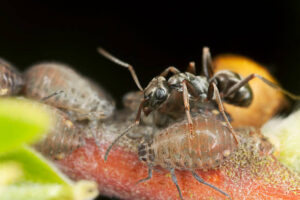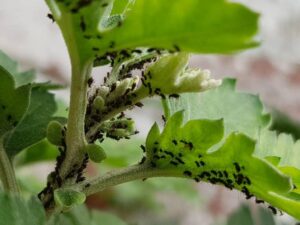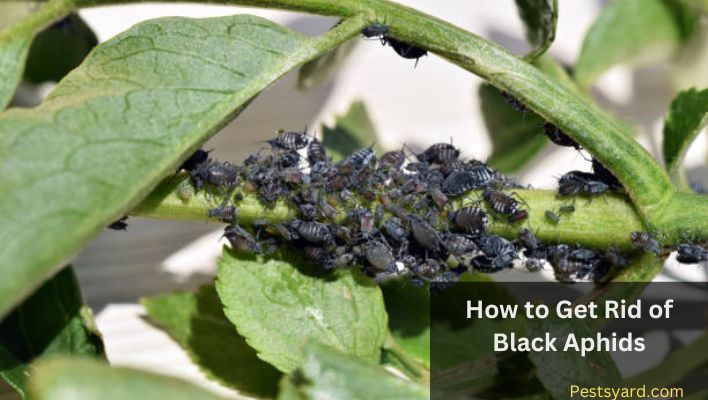Did you notice black aphids growing on the leaves? If you do, then you know how annoying these pests can be. They thrive on plants during the summer and make your plants look bad. The real question is, how do you get rid of these black pesky pests?
Black aphids are among the most common pest insects in many fruits and vegetables. Although they are not dangerous to humans or animals, an infestation of these insects will damage your plants.
These black insects are generally found on the underside of leaves and flowers. Some species will also infest peppers, tomatoes, and tobacco plants.
These black pests can make things unsightly in your garden and cause damage to plants by sucking the juices out of their leaves, damaging their foliage, and weakening the plants. They may also cause allergies for those sensitive to them when they come in contact with them.
To avert and prevent this, you need to know how to eliminate aphids in your garden. Luckily, there are many ways to control or eliminate black aphids. The best way is to go with a combination of methods listed below. And sticking with a solution that seems to work for you is always better.
Black aphids don’t bother people or pets, but they can be a serious problem for anyone who loves their garden. Without any further ado, below are the various way to get rid of black aphids from your garden.
How to get rid of black aphids
Aphids are small, soft-bodied insects that suck plant juices. They also can be vectors of diseases such as potato blight and black rot of potatoes, tobacco mosaic virus, and cauliflower mosaic virus. Aphids are similar to whiteflies but have green coloration.
Several species of aphids suck the juices from various plants, including corn, beans, cotton, fava beans, and many others. The most important control measure for the aphid life cycle is first to identify the species of the aphid so that appropriate control measures can be taken later on.
Black aphids are tiny, oval-shaped insects that suck the juices from leaves and flowers. They can be hard to spot because they are so tiny, but you can easily tell them apart from other aphids because they have black bodies and legs.
Black aphids also have characteristic honeydew excrement that glistens under ultraviolet light. The honeydew attracts ants and insects that feed on aphids or continue feeding your plants. Without any further ado, below are some organic solutions for getting rid of black aphids:
Use insecticidal soap
This method is great because it doesn’t require much effort or special equipment—just an insecticidal soap, some water, and a sprayer. It’s also effective if you follow your product’s recommended dosage/application times.
Insecticidal soap is a concentrated soap that kills insects when they come in contact with it. It’s used to treat ants, mealy bugs, and other pests. The first step is to ensure your soil has no limestone or other minerals that could be blocking the effectiveness of the insecticide.
You’ll need the following:
- 1 oz of insecticidal soap (or 1 tbsp of dishwashing liquid) per quart of water
- A sprayer
Mix up your insecticidal soap solution using one quart of water to 1 part of soap. Then pour this solution into a sprayer. Spray your plants with this solution every other week until they’re free of aphids (and don’t forget to clean your sprayer between applications).
Apply Neem oil
There are a few different ways to eliminate aphids, but spraying your plants with Neem oil is the most effective.
You can spray the Neem oil directly on the aphids and watch them die. Alternatively, you can apply the Neem oil to your plant’s leaves and stems.
Neem oil works by killing aphids on contact, so you’ll need to repeat this process a few times depending on how many aphids you have and how much damage they’re doing to your plants.
This will kill them and prevent them from spreading. The oil will also help keep other pests away, so you won’t need to use any more chemicals.
You can buy neem oil at most grocery stores or online. Just follow the instructions on the bottle and apply the solution directly to the affected areas of your plants once per week for three consecutive weeks.
Apply white vinegar
White vinegar is a natural solution for getting rid of black aphids; it’s acidic and will kill insects. Just place a few drops on the affected leaves of your plants and let them sit for a few days before rinsing them off with water.
- First, make sure you’re using the right kind of vinegar. White vinegar is best because it’s more effective than other types of vinegar at killing aphids.
- Next, use a spray bottle and fill it with one vinegar with four parts of water. Apply the vinegar to your plant(s) and let it sit for about an hour.
- Wipe off any remaining aphids with a damp rag or paper towel. You may also want to apply some neem oil on top of the vinegar when wiping off your plants, so they don’t re-infest later.
Planting garlic, chives, or other plants that deter aphids
These plants include garlic, chives, and other herbs and flowers with a strong scent that repels aphids. You can also apply garlic oil to the leaves of your plants before planting them in the ground. This will help repel aphids from the plant and attract beneficial insects like ladybugs and hoverflies that eat aphids.
Garlic is an excellent way to get rid of black aphids because it contains a compound called allicin that has an effective repellent effect on aphids. To maximize this effect, plant garlic early in the season. Planting garlic in the fall can also help prevent future infestations by keeping aphid populations low until they’re ready to come out of dormancy in the spring.
Chives are another great option for repelling black aphids. They’re strong enough to keep aphids away but aren’t invasive enough to harm your plants as they grow. You can also use them as an alternative crop in the summer when more tender crops need protecting from pests like aphids while they recover from being harvested themselves!
Other plants include
- dahlias,
- asters,
- orange-petalled nasturtium,
- marigolds,
- alliums,
- sunflowers
- petunias
These plants also attract parasitic wasps that remove aphids from your plants. This is a great solution if you have an entire garden full of aphids where nothing else also seems to work. Plant cloves around each affected plant’s base (about 2 inches apart).
Other options include planting chives or basil nearby; make sure they don’t compete with your main crop for nutrients or water.

Attracts beneficial insects
The best way to get rid of black aphids is by attracting beneficial insects; you can also buy ladybugs to eat the aphids. Beneficials will eat the aphids and other pests, keeping your garden healthy and happy.
Ladybugs are predatory insects, meaning they eat other insects. Aphids are soft-bodied insects that feed on plant sap and cause damage to plants by sucking nutrients from the plants.
If you have aphids on your plants, you can attract ladybugs by placing a few small pieces of banana peel in the area where you see the aphids. You can also try putting out specially-made ladybug pheromone traps in your garden.
Other aphids predictor include predatory midges, parasitoid wasps, lacewing larvae, rove beetles, and hoverfly larvae.
Use Diatomaceous Earth
Diatomaceous Earth is a natural substance made from the fossilized remains of tiny sea creatures called diatoms. It’s known for its ability to kill pests on contact and is often used as a way to control roaches, ants, fleas, and other pests. It’s also safe for pets, children, and the environment.
To use it, sprinkle some around your plants; you can also mix it with water and spray your entire garden. The best time to apply is when the plants are actively growing—for example, after they’ve been transplanted into their new location or if they’re flowering.
You could also use it around fruit trees during bloom season if you want to prevent aphids from attacking your crop later in the season.
You can find Diatomaceous Earth at most garden stores or online retailers like Amazon.
It also doesn’t carry any bad chemicals that pesticides do, so you won’t have to worry about any health issues from using it. Remember, when using DE, it’s a powdery substance that can be mixed with water before being applied directly to plants or soil, and you’ll be fighting these pests for good.
Use Epsom Salt
Epsom salt is a natural way to get rid of aphids because it works by drying the pests out and dehydrating them. The salt will also kill adult aphids and eggs on contact, so you won’t need to worry about more generations coming from your plants.
How to use Epsom salt
- Mix 1 cup of Epsom Salts with 1 gallon of warm water.
- Pour this solution into a sprayer and spray it on the affected plants.
- Let it sit for 20 minutes before rinsing the leaves with clean water.
- Repeat this treatment every four days until all aphids are gone!
Use Sticky Traps to Control Flying Black Aphids
Sticky traps, also known as sticky paper traps, are a good way to get rid of black aphids. They’re easy to make and use.
First, you will need some sticky paper. You can buy it at any hardware store or craft store. Make sure that the paper is thick enough not to disintegrate when it gets wet with rainwater or water from other plants in your garden.
Next, find a spot where lots of black aphids are on your plants. The best time to do this is in the morning before they disperse into the air (they move around during the day). Put down your sticky trap where you think they’ll be active during this period.
In about an hour or two after putting down your sticky trap, check for aphids on the paper and remove them by hand if you find any.
Use a targeted spray.
You can eliminate them by spraying targeted insecticides onto the affected plants.
You can purchase a spray made specifically for black aphids, or you can use a product designed to kill other aphids. If you choose to buy one, make sure it’s labeled for use on ornamental plants. Spray the affected area of the plant thoroughly with the insecticide until it dries completely.
After applying insecticide, water your plants well and allow them time to absorb any residue from the spray before watering again.
Best insecticide for aphids
Neemorganics Store Ready-to-Use Neem Oil

Neemorganics is an insecticide made from neem oil. It is a ready-to-use spray that is safe to use around people and animals, and usable on vegetables, fruits, ornamental plants, and flowers.
It controls aphids, whiteflies, thrips, and mealybugs. Also, it controls insects on indoor plants as well as outdoor plants. This product also works well against other pests, such as beetles, leafhoppers, and caterpillars.
Neemorganics is a non-systemic insecticide and can be used on multiple surfaces inside and outside your home without requiring additional treatment after application.
This product may be used with other pesticides to ensure the best results against target pests.
Southern Ag Natural Pyrethrin Concentrate

Southern Ag Natural Pyrethrin Concentrate is a natural organic insecticide that kills aphids and other insects. It is effective against many insects, including scales, mealybugs, white flies, thrips, mites, spider mites, beetles, & worms. Pets & livestock; fleas, mites, lice, flies, gnats, & mosquitoes.
Southern Ag Natural Pyrethrin Concentrate can be used in several different ways:
- Spray for spot treatment of aphid infestations on plants or around the base of plants.
- Apply as a soil drench to treat aphid infestations on the underside of leaves.
- Inject into plant tissue with a needle or syringe to treat aphid infestations directly in plant tissues or through wounds on leaves.
BioAdvanced Fruit Insecticide
BioAdvanced 701520A Fruit, Citrus & Vegetable Insect Control for Edible Gardening Concentrate is an all-natural insecticide that kills aphids, whiteflies, and many other pests. It is safe for use on edible plants, and it is not harmful to humans or pets.
BioAdvanced 701520A Fruit, Citrus & Vegetable Insect Control for Edible Gardening Concentrate is made from natural ingredients and controls aphids without harming bees or other beneficial insects. This product, which is easy to use, comes in a concentrated form that can be diluted with water before applying it to the soil around your plants.
How to get rid of aphids on houseplants
Aphids are small, green insects that feed on the foliage of plants. They can be found on various plants, including houseplants, trees, and shrubs. Aphids can also be found on their own in the soil, where they may have been transported from another part of your yard or garden.
If you notice black aphids on your houseplant, follow these steps to get rid of them:
- Remove any infested leaves from the plant (after removing any eggs or larvae that may be present).
- Spray the plant with insecticidal soap and water (ensure you rinse off all soap before allowing the plant to dry).
- Use horticultural oil for infestations that have reached their peak. You can either apply it directly to the area where you see signs of infestation (such as tiny black spots on leaves) or spray it on everything in the pot. If the plant is indoors, cover it with a plastic bag so that no drops of oil fall onto floors or furniture.
- You can also use neem oil or pyrethrum flower extract (also known as rotenone) on your houseplants to get rid of aphids. Both neem oil and pyrethrum flower extract are natural insecticides derived from plants, so they won’t harm your plants in any way.
All these methods are proven effective against aphids and other soft body pests to make your plants healthy again.

How to Prevent Aphids
Aphids are a common pest of many plants, including tomatoes and peppers. They can also be found on eggplant, potatoes, and other vegetables. Aphids suck sap from plants, leaving behind a sticky substance called honeydew. The honeydew can lead to leaf spotting and reduced plant growth.
There are several ways you can prevent aphids from infesting your garden:
- Remove any weeds or grasses near your plants, so they don’t serve as hosts for pests like aphids.
- Make sure that wind isn’t blowing directly onto your plants at all times, preventing pests from landing on them and spreading to nearby plants.
- Use insecticidal soap on leaves that have been affected by aphids or other pests; this will kill them without harming the rest of your plant. If these methods don’t seem effective enough, you may need to use more extreme measures such as insecticidal soaps or insecticidal sprays (which should only be used according to directions).
- Plant-resistant varieties of crops that do not have a history of being attacked by aphids. This will help ensure that your crop is free from these pests in the future.
- Buy certified organic seeds whenever possible because these seeds are often more resistant to attack by harmful pests than non-certified seed varieties sold by retailers who sell them without certification (this is called wild or “heirloom” seed).
- Avoid planting in areas where aphids have been seen (and are likely). If you’re unsure of an area’s history, look out for the presence of aphids and their eggs in nearby plants—they’ll leave behind telltale signs.
- Keep your plants well-watered. This will keep them healthy and discourage aphid attacks.
- Maintain good hygiene around your plants when you’re working with them: wear gloves (or better yet, an apron), wash your hands after touching any plant material (or before eating), use a face mask or smock if you’re going to be working close to the plants themselves, etcetera.
- Consider using natural solutions such as garlic or neem oil on your plants that might repel insects like aphids from coming near them (but only if you’re sure these solutions won’t harm them).

